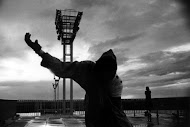Three reckless assumptions made while waiting in line to see a film about a Haruki Murakami book I hadn't read:
1. There will a man who suffers because his beloved is missing/dead/spectral. It's the only way Murakami does things. In Anh Hung Tran's Norwegian Wood, Toru Watanabe (Kenichi Matsuyama) loves from early adolescence Naoko (Rinko Kikuchi), a quiet girl unavailable to Toru until the suicide of her boyfriend Kizuki (Kengo Kora). So Toru goes on pining for Naoko, who winds up ensconced in a remote psychiatric ward with really poor patient oversight (there's a lot more hand jobs than I've observed in contemporary American facilities).
2. The man will be unable to act with any agency. Toru spends most of his time away from Naoko in his college dormitory. During one downcast luncheon he meets Midori (Kiko Mizuhara, created by some genetic alchemist for maximum cuteness and wearing enough carefully selected barrettes to make Style Rookie jealous). Despite her well-developed skills in flirtation, this Pinkerton dreamgirl cannot shake Toru's loyalty to Naoko.
3. The film will be filled with jazz. Here I was way off, and not just because the story obviously involves the title song. Somehow the Radiohead fanboy news did not trickle down to me that Jonny Greenwood was scoring the film. I scribbled in my notebook that the sounds are like "mournful glaciers" and the music was, at least at Seattle's Egyptian, bracingly loud (grumbling sidenote: this is the same theatre management that turned the volume all the way down for Malick's The Tree of Life, to the point that subtitles would have been helpful).
Three favorite visual details:
1. Norwegian Wood, particularly in the opening sequences, is loaded with quickly sketched, memorable images. Toru spends his only pre-sanitarium time with Naoko in the lavender light of her apartment, with background lilacs and hydrangeas emphasizing her delicate nature. When they embrace, their bodies run down the frame diagonally to create more tension than your average sex scene.
2. Charmingly, late 60's Japanese university students carry their books strapped together in belts, which are often complimentary to their outfits. What's more, these outfits often involve brightly patterned sweatervests! At times there's such a giddy display of Japanese prep on screen that I had to stop myself from clapping.
3. Later in the film, Tran supplies a great metaphor for the nature of letter writing. Toru's missive to Naoko is interrupted when he starts to pick at a barely healed scab in the palm of his hand. This action is interspersed with shots of nettles from around Naoko's sanitarium--all of that thorny past drawing blood.
Three secondary characters with surprising impact:
1. Nagasawa (Tetsuji Tamayama) is Toru's playboy college chum, with hair never less than carefully-coiffed and a closet full of rakish turtlenecks. He's the man that makes you ask yourself how rad was college in Tokyo in the 60's? He encourages the caddish side of Toru and why not--he's constantly hooking up with ladies in swank apartments that are decorated indistinguishably from an Anthropologie store.
2. Hatsumi (Eriko Hatsune) is Nagasawa's long-suffering girlfriend, totally peripheral for all but one sequence, when she hosts a dinner party. As she gives Nagasawa a tongue-lashing for his unapologetic girl swapping, the camera bears down on her and we have one of the most extended closeups in the film. She's wearing clear-beaded necklace that makes it look like her head had been reattached to her neck. Hatsumi's turn in the spotlight even ends with a cab ride straight out of In the Mood for Love.
3. Reiko (Reika Kirishima) is Naoko's roommate/guardian/music teacher for most of the film, though she eventually gets to know Toru much better (through a kind of sexual grieving familiar to Murakami fans and Chazz Reinhold). She performs an aborted acoustic version of "Norwegian Wood" early on--only to drop out for almost an hour--and returns at the very end for logically confused reasons. I suppose she promotes melancholy.
Three notes on the relationship between Tran and Murakami's work:
1. I felt that Tran did well to make his own Norwegian Wood though he could not resist a quintessential Murakami passage. Midori, on the topic of dessert:
"Like, say I tell you I want to eat strawberry shortcake. And you stop everything you’re doing and run out and buy it for me. And you come back out of breath and get down on your knees and hold this strawberry shortcake out to me. And I say I don’t want it anymore and throw it out the window."
There's the author's theory of love in four short sentences.
2. Tran generated more drama than I expected in a Murakami adaptation with his aggressive use of sound. Besides Greenwood's sometimes punishing score, there's a lot of anguished wails from Naoko that rip through all Toru's gentle affections. No matter what else I think about her acting, I acknowledge that Rinko Kikuchi can make some really loud noises.
3. Tran draws closer to Murakami with his choices in cinematography. There's a recursivity of long tracking takes that follow characters at a distance, like the lovely one in which the camera starts with Toru and Naoko on a forest path, winds with them a while, then loses them in the trees. Lengthy scenes like these reminded me of Jun Ichikawa's tidy Tony TakitaniBlind Willow, Sleeping Woman). Murakami works are not fast-paced and I'm thankful that Tran used deliberate compositions instead of an over-reliance on voiceover narration. A few weeks after seeing Norwegian Wood, I'm just as nostalgic as I ought to be.














